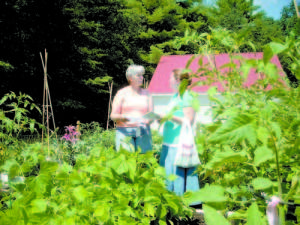Growing independence in the community garden

Resident Master Gardener Patrice Griffin discusses moths and blight with Bridgton resident Kari Reed at the Naples Community Garden on Tuesday. (De Busk Photo)
By Dawn De Busk
Staff Writer
NAPLES — Kari Reed and her husband Chaz have four daughters ranging in age from nine- to three-years old.
Recently, the couple took on the care of three other children from relatives.
So, when it comes to mealtime, there are a lot of people at the kitchen table.
This summer, the Reed family started a variety of edible plants in the Naples Community Garden.
The garden is located behind the Naples Town Office; and last year, the harvest supplemented the food pantry organized by Crosswalks Community Outreach. The outreach program aids people in five towns including Bridgton, Harrison, Naples, Casco and Sebago.
This year, Crosswalks organizers selected some pantry participants and provided those 14 families with spaces in the garden plus the assistance of an on-site master gardener.
On Tuesday — while her two oldest daughters were swimming, Kari spent a few hours weeding and treating some leaves for powdery mildew.
Another couple weeded and raked the pathways between the raised garden beds, while volunteers got rid of the perennial grasses trying to trespass the garden fence.
Later in the day, Kari went home with sugar snap peas, cucumbers, green beans, parsley, basil, a recipe for vegetable lasagna, and a satisfied smile.
Typically, her daughters Hannah, 9, and Michaela, 7, spend at least once or sometimes twice a week taking care of their garden plot.
“They are ecstatic about the garden. They like to see how much stuff has grown. They are like mother hens. They panic when mold or bugs get into a crop,†Kari said.
The fairy house and flowers in the plot stand testament to the creative aspect of gardening.
Nutrition-wise: Many of the cucumbers the girls picked never made it home.
Recently, the family saved the brine from a jar of pickles and sliced fresh cucumbers to cure in the pickle juice. About 24 hours later, the girls could not wait. They made sandwiches to accompany the homemade pickles, Kari said.
“I’ve enjoyed having a garden so much. I like to see the changes every time I come here,†she said.
“I am learning so much. It is nice to have people right there to answer questions,†she said.
Twice a month, Resident Master Gardener Pat Griffin holds a workshop for the group. Toward the beginning of the growing season, Griffin taught everyone about composting.
According to Crosswalks Board of Directors President Nancy Vose, “gardening is all about nutrients.â€
“The big national gardens don’t have the nutrients. No compost, no manure and all chemicals. So, it is really important to have nutrients in your personal garden,†she said.
Participants learned how to utilize kitchen leftovers, coffee grounds, and grass clippings from the lawn for making compost, Vose said.
“As long as you have a good balance of green and brown debris,†in the compost pile, she said.
The people involved in the community garden “have always wanted to garden, and didn’t do it — for whatever reason. Now, they have learned how to have a garden,†Vose said.
One family happily received a bag of manure and soil to start a second garden where they live.
Kari said that she toyed around with a small garden last summer, but did not have enough space in her yard this year.
“This is really awesome. It came at a good time. It has been super helpful,†she said, estimating she puts in about five or six hours a week at the garden.
The Reed family has been offered a space in the community garden next summer. Kari said she hopes to “plan out her crops, and really pack it in.â€
According to Griffin, next year’s workshops will start sooner — in the late winter with classes on how to plan a garden plot and how to order seeds. It is much less expensive to purchase seeds than to invest in trays of starters, she said.
This summer as family members harvest the crops — the most frequent question is how to prepare the fresh ingredients.
“You can put the zucchini in a blender, and then add it to store-bought spaghetti sauce. The kids will never know what hit them,†Griffin said.
Another tip for tricking children into eating their vegetables is to blend summer squash, and add it to macaroni and cheese, she said.
Both Vose and Griffin said the community part of the garden is a big plus. It allows gardeners to keep an eye on other people’s crops. It allows gardeners to share and swap their harvest. It allows people to exchange ideas.
Griffin said that when she volunteers at the food pantry kitchen, she listens to the conversations. Frequently, people are discussing where their next meal will come from. They are scheduling rides around the various food pantries in the region. She said some people drive as far as Scarborough to be in line at the food pantry on the days it is open.
“I was calculating the cost of gas to drive that far. I was thinking how much cheaper it would be if more people had gardens to grow food for themselves,†she said.
Vose agreed.
“The idea is to train people how to garden. We like to help people become independent,†Vose said.
“Our garden is a lot of fun. Each garden is a little different. All the gardeners are so helpful with one another,†she said.

